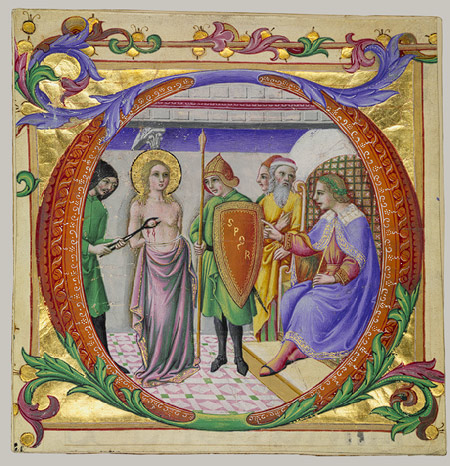Below, an abridged translation from the third volume of
Karlheinz Deschner’s Kriminalgeschichte des Christentums.
Most of the written statements about the martyrs are false, but all of them were considered as totally valid historical documents (7 of 7)
Although the number of Christian martyrs in the first three centuries could be calculated at 1,500 (a figure certainly problematic), although of the 250 Greek martyrs in 250 years only 20 are historical, although only written news of a couple of dozen martyrs remain and although the greatest theologian of the pre-Constantine era, Origen, says that the number of Christian martyrs is ‘small and easy to tell’, in 1959, the Catholic theologian Stockmeier continues writing:
For three centuries they were persecuted to death.
Also in the middle of the 20th century, the Jesuit Hertling writes:
It is necessary to assume a six-digit number.
Is it really necessary? Why? He himself says it: ‘The historian who critically analyses the sources and wants to relate things as they have been, constantly runs the risk of hurting pious feelings—if he does not reach the result that there were millions of martyrs’.
But the Church has not only criminally exaggerated the number of martyrs, but also its description. Still in the middle of the 20th century, the Catholic Johannes Schuck boasts (with double imprimatur), as if the history of the Church by Eusebius of the 4th century continued:
It was a fight! On the one hand the beasts of the circus, the bonfire that burns the throbbing limbs, the torture, the cross and all the torments that seemed to come out of hell like a dirty sewer. On the other hand, the unwavering strength with which Christians faced the whole world, helpless… with the heart already under the first glows of eternity.
Schuck himself rejoices that the cruel persecutions against Christians ‘produced a great benefit to the kingdom of God’, and that ‘the Church only won’. While ‘the blood of their martyrs’ deprived ‘the Church from its most valuable souls’, these, who were the best, ‘passed into the fold of the Lord by faith and the spirit of sacrifice, love and nobility of the Christians’.
And with a tide of fabrications.
Fabrications of this kind were also found in another very different, though interdependent, field of ecclesiastical politics. Just as in order to increase the faith the written statements about false martyrs were created to increase the clerical power, false catalogues of bishops were made. That is, little by little an apostolic origin was attributed to all episcopal sees.
______ 卐 ______
Liked it? Take a second to support this site.

3 replies on “Christianity’s Criminal History, 100”
Feeling lost and hopeless? Call a catholic priest for a good time.
Flesh and ‘bone’, by the telephone.
“Schuck himself rejoices that the cruel persecutions against Christians ‘produced a great benefit to the kingdom of God’, and that ‘the Church only won’.”
Christians need to feel persecuted, just as their “elder brothers in Christ” the Jews need it. The perception that one is targeted by a hostile Other is fundamental to ingroup/outgroup distinctions. It’s a great help to organizational effectiveness and group solidarity. The idea that “they are ought to get us” is also what provides all sorts of conspiracy theories with their enduring appeal. Hitler himself used this basic psychological mechanism to promote his political cause in Christian Germany. It comes easy for Christians to feel themselves persecuted. They actually like it, because the more they feel themselves to be persecuted, the more virtuous they can imagine themselves to be. Certainly, among the most dubious contributions of Christianity to Western civilization is the boost it has given to this conspiratorial bent of mind. The cult of the crucified rabbi, who was the original martyr — conspired against, whipped and scourged, and then crucified — has given rise to an entire culture based on victims. “Who is the greatest victim?” has become the question of our age. Everyone wants to be the greatest victim, since all virtue is perceived to accrue to the one who is. This marks a sharp break from classical civilization, when nobody wanted to be the victim. It’s a turn for the worse; a disease or neurosis of the collective mind encouraged and embodied by Christianity. Christianity’s congenital insanity has given birth to a mad world in which truth is a very low priority, and there is no balance; a culture of lies founded by liars.